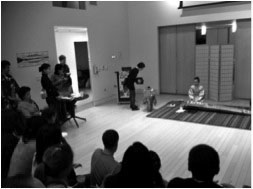By Ryoji Watanabe, News Writer, MC/MPA’12
What started as a peaceful afternoon on March 11th, 2011 quickly became one of the most devastating and traumatic days Japan has ever seen. A tsunami crashed into the beautiful landscape of vast rice fields and seaside houses. Massive waves tore buildings from their foundations and tossed cars into trees and houses as if they were toys. Local people’s livelihoods, including their treasured keepsakes, were washed away instantly in the seaside towns of Tohoku, the North East Japan. The earthquake, later named as the Great East Japan Earthquake, was the largest natural disaster in the nation’s history.
Many current HKS Japanese students were in the earthquake that ravaged Tokyo that day. “After the earthquake, we were not able to contact our loved ones, and were faced with a shortage of electricity and the food supply. I realized how fragile our society could be in times of crises,” recalled Kanoko Kamata, an MC/MPA student and an HKS Japan Caucus member.
The HKS Japan Trip 2012, organized by the Japan Caucus, will begin its first day on the one year Anniversary of the event. This annual spring break tradition started in 2005. However, it was not held for the past three years due to the decline of the number of Japanese students, appreciation of the Japanese yen, and the earthquake disaster. The trip was revived this year due to the concern among Japanese HKS students of the world’s view of Japan after the earthquake. 30 HKS students, comprised of Japanese nationals and other students interested in Japan, have already signed up.
Japan Caucus members hope that the experience will help HKS students to gain a better understanding of Japan’s presence in the world. They also wish to introduce Japan to the future world leaders at HKS, and aim to have every participant enjoy their time interacting with Japanese politicians and citizens. “I was delighted to hear my classmates telling me how they were impressed with Japanese supporting and caring about each other in the aftermath of the disaster, such as sharing food and other limited resources,” said Ms. Kamata, who helped organize the trip. “As we are seeing increased number of natural disasters and beginning to see shortage of resources in the world, I am hoping that the experience in Japan will provide some takeaways for the participants that could help make the world a better place.”
In the past, Japan Trip participants met with Japanese Prime Ministers, HKS alumni who became politicians, and CEOs of leading Japanese companies. They also visited major tourist attractions and experienced local culture. During one their visits, the Japanese media actually wrote an article about them titled, “How the Future World Leaders View Japan”!
This year, participants in the Japan Trip will once again visit leading politicians and company executives, and will experience local culture by visiting shrines and temples. But there will be an added component to help students understand what happened to the country after the earthquake. An additional stop at Rikuzentakata, a city in Tohoku that was mostly wiped out by the tsunami, will give students a first-hand look at the recovery efforts. They will be visiting the municipal government and a local entrepreneur who aims to revive the region’s renowned oyster cultivation.
“A year has passed since the tragic earthquake happened in our nation, and it is a critical phase for Japan in its recovery,” said Jiro Yoshino, an MPA student and the Japan Caucus Chairperson. Mr. Yoshino added, “I strongly believe that having our HKS classmates see Japan and actually talk with people who are making efforts to overcome the unprecedented hardship is meaningful.”
The participating students will be blogging about Japan throughout the trip on the following website created by the Japan Caucus.
Japan Trip Blog: http://www.hksjapancaucus.com/
One of the major challenges that Japan is facing is the decline of tourists after the earthquake. Japan Caucus members hope that the blogs from the HKS students will reach an international audience, thus promoting tourism to Japan, and bring more visitors to this high tech, yet historic and beautiful nation.

